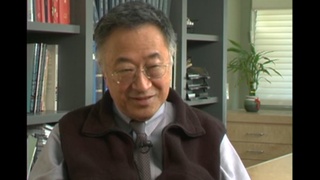Interviews
Criteria for who gets redress
Our criteria for redress, at that time, was if you were in camp—because camp has a roster of everybody that was there—we use that roster and they would all be eligible for redress. Of course we got some criticism from people who were not in camp, like from eastern Washington, eastern Oregon, they did not go into camp. Like in California it was the same thing, the military zone number one was the western half of the states, and the eastern half was a military zone number two. In California, as you know, both [military zones] had to go into camp. And because of that they said in Washington they were all ready. They were told to be ready, so they got rid of their properties, and had suitcases packed and ready. But the final order never came.
Date: July 1-2, 1998
Location: California, US
Interviewer: Mitchell Maki, Darcie Iki
Contributed by: Watase Media Arts Center, Japanese American National Museum
Explore More Videos

Making the decision to resist the draft
(b. 1923) Nisei from Washington. Resisted draft during WWII.

Thoughts on redress
(b. 1923) Nisei from Washington. Resisted draft during WWII.

Social activities in Tashme
(b.1920) Japanese Canadian Nisei. Established the Ikenobo Ikebana Society of Toronto

Getting Jim Wright to sponsor the bill
(b. 1931) U.S. Former Secretary of Transportation

Difference between experiences of youth and older people in WWII camps
(b.1929) Pioneer medical researcher in tissue transfer and organ transplantation.

Death of sister in October 1942
(1915 - 2011) Nisei florist who resettled in New York City after WW II. Active in Japanese American civil rights movement

Father in camp but learning from history books
Giant Robot co-founder and publisher

Mixed blood people at camp from a child's point of view
(b. 1934) Writer


Documenting family history for future generations
(b. 1934) Writer

Positive experiences with Asian Americans for Action
(1924-2018) Researcher, Activist

Different learning style in Japan and the United States
(1918-2023) Nisei Japanese kabuki dancer

Redress payments to Issei who did not enter camps
(1924-2018) Researcher, Activist


Waiting for the right time to start Redress Movement
(1924-2018) Researcher, Activist
